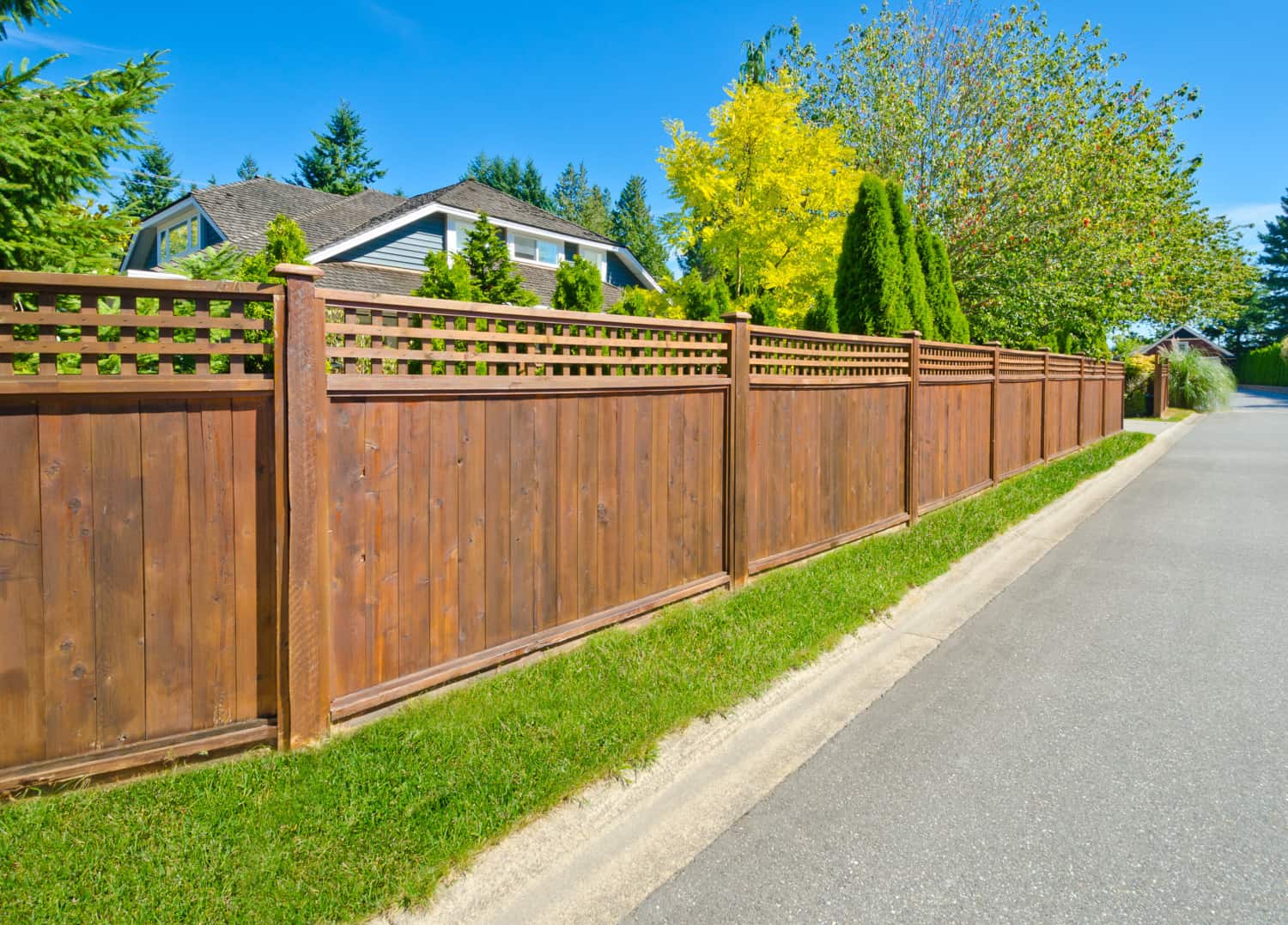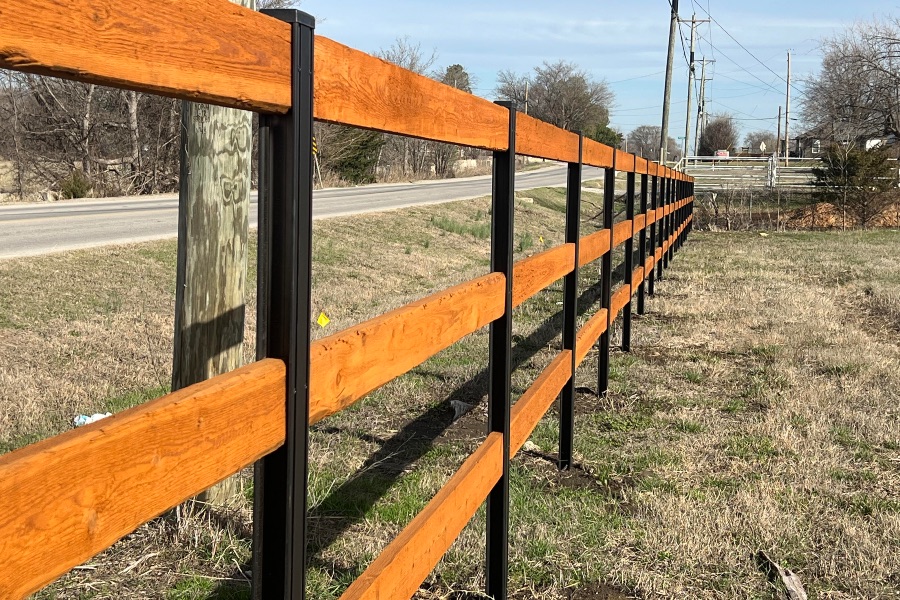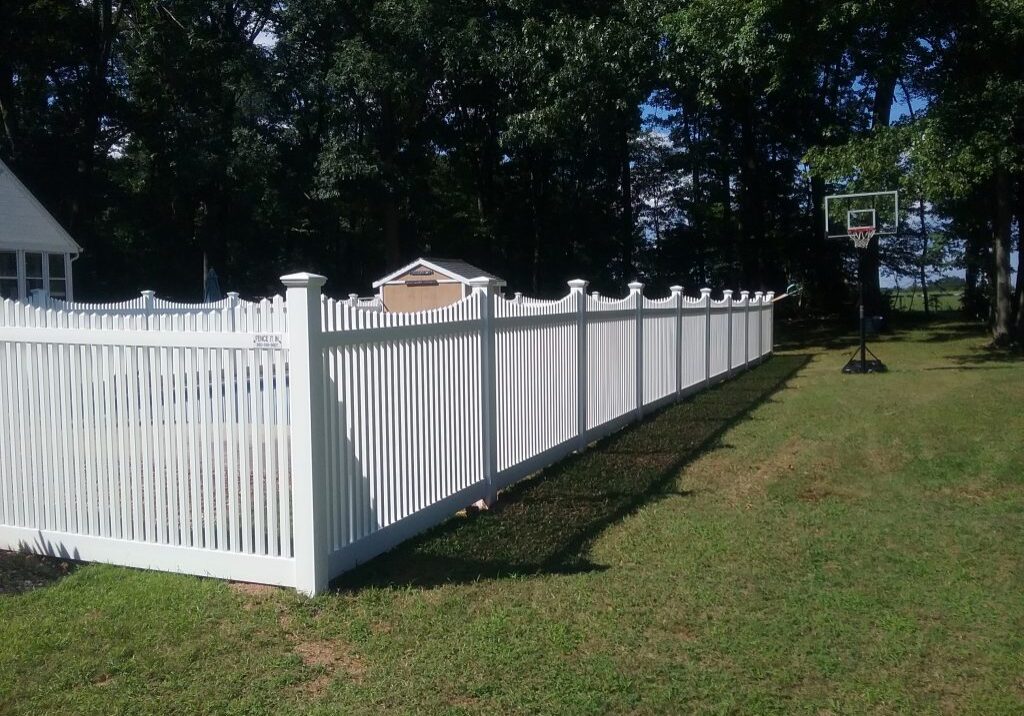All Categories
Featured
Choosing the right fencing product for your home is a substantial decision, and each alternative features its own collection of advantages and obstacles. Wood, vinyl, and light weight aluminum are amongst one of the most preferred products for both household and industrial fencing. Right here's a break down of the advantages and disadvantages of each to aid you make a decision which is ideal for your requirements.
Wood Fencing. Pros:
Aesthetic Allure: Timber uses a timeless, natural look that matches nearly any type of design of home. It can be repainted or tarnished in a variety of shades, enabling total modification. Whether you're aiming for a rustic, country-style appearance or an extra refined and polished look, wood is versatile.
Cost-efficient: Usually, wood fences are among one of the most inexpensive choices when it concerns upfront costs. It's an excellent choice for those on a budget who desire a high quality fencing without a high price tag.
![]()
Customization: Timber can be quickly adapted to fit any type of form or size. You can pick from various designs such as privacy, picket, or ranch-style fences. It's also simple to modify, fix, or replace components if needed.
Disadvantages:
Upkeep: Timber fences call for routine upkeep. They must be discolored or painted periodically to avoid parasite, rot, or bending infestation. Without maintenance, wood can degrade much faster, particularly in damp or damp environments.
Susceptibility to Damages: Wood is vulnerable to harm from insects, such as termites, and weather problems, like high winds, rainfall, or snow. Over time, direct exposure to these components can trigger the timber to fracture, splinter, or warp.
Much Shorter Life-span: While wood fencings can last for several years, they usually have a shorter lifespan compared to vinyl or aluminum, particularly if not preserved regularly.
Vinyl Fence. Pros:
Low Upkeep: One of the most eye-catching features of plastic fences is that they require little to no upkeep. Unlike timber, plastic doesn't need to be painted or discolored. It's immune to fading, fracturing, and warping, making it perfect for those that desire a problem-free fencing.
Toughness: Plastic fencings are extremely durable and can endure rough climate condition, including extreme warmth, hefty rain, or snow. They're likewise immune to bugs like termites, which can ruin wood fences.
Lengthy Lifespan: Vinyl fencings can last for 20-30 years or more with very little maintenance. Lots of makers offer guarantees, giving comfort and more improving the value of your investment.
![]()
Variety of Styles: Readily available in a series of shades, structures, and layouts, plastic fences can imitate the appearance of wood but without the upkeep. They are available in designs like personal privacy, picket, and ornamental, making them extremely adjustable.
Cons:
Higher First Cost: The ahead of time price of plastic fencing is generally greater than timber, making it much less affordable for some. Nonetheless, its long life and low upkeep make it a beneficial investment in the long run.
Weak in Winter: In chillier environments, plastic can become fragile gradually, that makes it more vulnerable to breaking if subjected to influence. This might be a concern in areas with extreme winters.
Restricted Customization: While vinyl comes in a selection of design and colors, it's not as customizable as timber. Vinyl may not be the ideal option. if you have a very particular vision in mind.
Light Weight Aluminum Fence. Pros:
Low Upkeep: Aluminum is another product that requires extremely little upkeep. Unlike timber, it does not corrosion, wear away, or fade. This makes it optimal for atmospheres with extreme weather or seaside areas where saltwater can trigger deterioration.
Toughness: Light weight aluminum fencings are recognized for their toughness and lengthy lifespan. They can withstand harsh weather condition, and unlike wood or plastic, they are immune to parasites and won't wear away gradually.
![]()
Aesthetic Allure: Light weight aluminum fencings supply a streamlined, elegant look and are frequently made use of for decorative purposes. They are offered in various styles and coatings and can improve the total visual allure of your residential or commercial property.
Protection: Light weight aluminum is a durable product, making it a superb choice for offering safety around your residential property. It's usually made use of for residential safety and security secure fencing as well as for pool units.
Cons:
Expense: Light weight aluminum fencings are commonly a lot more expensive than timber and sometimes also plastic, specifically when choosing decorative or custom-made styles. The initial cost might be a deterrent for some property owners.
Less Privacy: Among the downsides of aluminum is that it typically offers less personal privacy compared to timber or vinyl. The voids in between the bars or slats can be vast, which enables individuals to translucent the fencing. If personal privacy is necessary to you, this might not be the very best alternative.
Denting: While light weight aluminum is sturdy, it is prone to nicking from heavy impacts, such as auto accidents or criminal damage. While it won't corrosion, a damage can jeopardize its appearance and honesty.
Which Product Should You Pick? The decision in between light weight aluminum, timber, and vinyl secure fencing comes down to your budget plan, the quantity of maintenance you're ready to handle, and the details demands of your residential property. If you like an all-natural, customizable look and are prepared to maintain it, timber may be the way to go.
Consider your residential or commercial property's environment, the degree of personal privacy or protection you require, and the long-term financial investment you agree to make. Whichever product you select, each deals special benefits that can enhance your home or company while offering functionality and design.
Wood Fencing. Pros:
Aesthetic Allure: Timber uses a timeless, natural look that matches nearly any type of design of home. It can be repainted or tarnished in a variety of shades, enabling total modification. Whether you're aiming for a rustic, country-style appearance or an extra refined and polished look, wood is versatile.
Cost-efficient: Usually, wood fences are among one of the most inexpensive choices when it concerns upfront costs. It's an excellent choice for those on a budget who desire a high quality fencing without a high price tag.

Customization: Timber can be quickly adapted to fit any type of form or size. You can pick from various designs such as privacy, picket, or ranch-style fences. It's also simple to modify, fix, or replace components if needed.
Disadvantages:
Upkeep: Timber fences call for routine upkeep. They must be discolored or painted periodically to avoid parasite, rot, or bending infestation. Without maintenance, wood can degrade much faster, particularly in damp or damp environments.
Susceptibility to Damages: Wood is vulnerable to harm from insects, such as termites, and weather problems, like high winds, rainfall, or snow. Over time, direct exposure to these components can trigger the timber to fracture, splinter, or warp.
Much Shorter Life-span: While wood fencings can last for several years, they usually have a shorter lifespan compared to vinyl or aluminum, particularly if not preserved regularly.
Vinyl Fence. Pros:
Low Upkeep: One of the most eye-catching features of plastic fences is that they require little to no upkeep. Unlike timber, plastic doesn't need to be painted or discolored. It's immune to fading, fracturing, and warping, making it perfect for those that desire a problem-free fencing.
Toughness: Plastic fencings are extremely durable and can endure rough climate condition, including extreme warmth, hefty rain, or snow. They're likewise immune to bugs like termites, which can ruin wood fences.
Lengthy Lifespan: Vinyl fencings can last for 20-30 years or more with very little maintenance. Lots of makers offer guarantees, giving comfort and more improving the value of your investment.

Variety of Styles: Readily available in a series of shades, structures, and layouts, plastic fences can imitate the appearance of wood but without the upkeep. They are available in designs like personal privacy, picket, and ornamental, making them extremely adjustable.
Cons:
Higher First Cost: The ahead of time price of plastic fencing is generally greater than timber, making it much less affordable for some. Nonetheless, its long life and low upkeep make it a beneficial investment in the long run.
Weak in Winter: In chillier environments, plastic can become fragile gradually, that makes it more vulnerable to breaking if subjected to influence. This might be a concern in areas with extreme winters.
Restricted Customization: While vinyl comes in a selection of design and colors, it's not as customizable as timber. Vinyl may not be the ideal option. if you have a very particular vision in mind.
Light Weight Aluminum Fence. Pros:
Low Upkeep: Aluminum is another product that requires extremely little upkeep. Unlike timber, it does not corrosion, wear away, or fade. This makes it optimal for atmospheres with extreme weather or seaside areas where saltwater can trigger deterioration.
Toughness: Light weight aluminum fencings are recognized for their toughness and lengthy lifespan. They can withstand harsh weather condition, and unlike wood or plastic, they are immune to parasites and won't wear away gradually.

Aesthetic Allure: Light weight aluminum fencings supply a streamlined, elegant look and are frequently made use of for decorative purposes. They are offered in various styles and coatings and can improve the total visual allure of your residential or commercial property.
Protection: Light weight aluminum is a durable product, making it a superb choice for offering safety around your residential property. It's usually made use of for residential safety and security secure fencing as well as for pool units.
Cons:
Expense: Light weight aluminum fencings are commonly a lot more expensive than timber and sometimes also plastic, specifically when choosing decorative or custom-made styles. The initial cost might be a deterrent for some property owners.
Less Privacy: Among the downsides of aluminum is that it typically offers less personal privacy compared to timber or vinyl. The voids in between the bars or slats can be vast, which enables individuals to translucent the fencing. If personal privacy is necessary to you, this might not be the very best alternative.
Denting: While light weight aluminum is sturdy, it is prone to nicking from heavy impacts, such as auto accidents or criminal damage. While it won't corrosion, a damage can jeopardize its appearance and honesty.
Which Product Should You Pick? The decision in between light weight aluminum, timber, and vinyl secure fencing comes down to your budget plan, the quantity of maintenance you're ready to handle, and the details demands of your residential property. If you like an all-natural, customizable look and are prepared to maintain it, timber may be the way to go.
Consider your residential or commercial property's environment, the degree of personal privacy or protection you require, and the long-term financial investment you agree to make. Whichever product you select, each deals special benefits that can enhance your home or company while offering functionality and design.
Latest Posts
Take Advantage of Limited-Time Auto Repair Deals in Chicago at Montclare Auto Repair
Published May 28, 25
1 min read
Improve Your Home's Outside with Weathercraft's Siding Solutions
Published May 27, 25
1 min read
Unlock Your Financial Partner at WyHy – Key Advantages for Your Financial Success
Published May 25, 25
1 min read
More
Latest Posts
Take Advantage of Limited-Time Auto Repair Deals in Chicago at Montclare Auto Repair
Published May 28, 25
1 min read
Improve Your Home's Outside with Weathercraft's Siding Solutions
Published May 27, 25
1 min read
Unlock Your Financial Partner at WyHy – Key Advantages for Your Financial Success
Published May 25, 25
1 min read